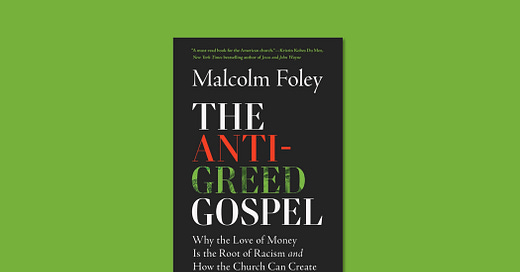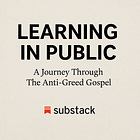THE ANTI-GREED GOSPEL: Introduction (Learning in Public)
Introduction: Breaking the Cycle
The Anti-Greed Gospel: Introduction
Introduction: Breaking the Cycle
Overview of the Introduction
In the introduction to The Anti-Greed Gospel, Malcolm Foley invites us into a theological, historical, and deeply personal exploration of the relationship between race and greed. Rather than framing racism primarily as hate or ignorance, Foley challenges us to see racism as a byproduct of greed—the child of Mammon.
Drawing from the legacy of Ida B. Wells and Martin Luther King Jr., Foley argues that racism is not sustained by irrational hatred alone, but by material desire and economic exploitation. He roots this claim in the biblical language of idolatry: greed is not just bad behavior—it is worship of a false god. Mammon demands blood, and the systems of racialized capitalism we live in have delivered.
This is not just a historical analysis; it’s a call to repentance and reimagination. If the kingdom of God is about Jesus, then the political economy of that kingdom must be defined by love, solidarity, and redistribution—not domination, accumulation, or self-interest.
What I’m Wrestling With
This chapter felt like stepping into a deeper reality I had sensed but hadn’t fully named. I’ve often talked about racism in terms of broken relationships and cultural misunderstanding—but Foley pushes further. He’s asking: What if racism wasn’t primarily about how we see each other, but about what we want to own, control, and protect?
I’m especially struck by his claim that seven of the Ten Commandments are violated by the construction of race. That’s not just a political statement—it’s a deeply theological one. And it forces me to ask: If greed is at the root, how often have I let it hide in plain sight?
This isn’t just a critique of the past. It’s a question about how we live right now. As a pastor, as a neighbor, as someone with power and privilege—how often do I serve Mammon without even realizing it?
Key Quotes from the Chapter
“the white man’s dollar is his god. . . . The appeal to the white man’s pocket has ever been more effectual than all the appeals ever made to his conscience.” — Ida B. Wells
“Race is not primarily about hate and ignorance. It’s about greed. It always has been. And the purpose of this book is that you might understand the unholy relationship between race and greed, best understood not as a marriage but in terms of parentage: race and racism are children of Mammon.” — Malcolm Foley
“the book’s primary thrust is to imagine how we can build Christian communities that resist the death-dealing talons and tendrils of racialized capitalism. Such a project begins with this acknowledgment: an anti-racist community is an anti-greed community. An anti-racist community is a community in which the desire for more is excised and replaced with a robust embrace of the communion of the saints. Such a community follows the logic of the kingdom of God: authority and resources are to be shared rather than hoarded.” — Malcolm Foley
“Race is about money, and the kingdom is about Jesus.” — Malcolm Foley
Questions I’m Sitting With
Where does Mammon still have a grip on my imagination?
In what ways has greed shaped my understanding of race and justice?
What would it mean for my church or community to become an anti-greed space?
The Conversation
When you reflect on racism as a greed problem more than a hate problem, what new questions or emotions surface for you?
The Week’s Poll
Next Up: Chapter 1
“How Greed Gave Birth to Race”
We’ll dig into how capitalism, colonialism, and slavery set the stage for race to become a powerful myth of justification—and how violence was always greed’s favorite scene partner.







